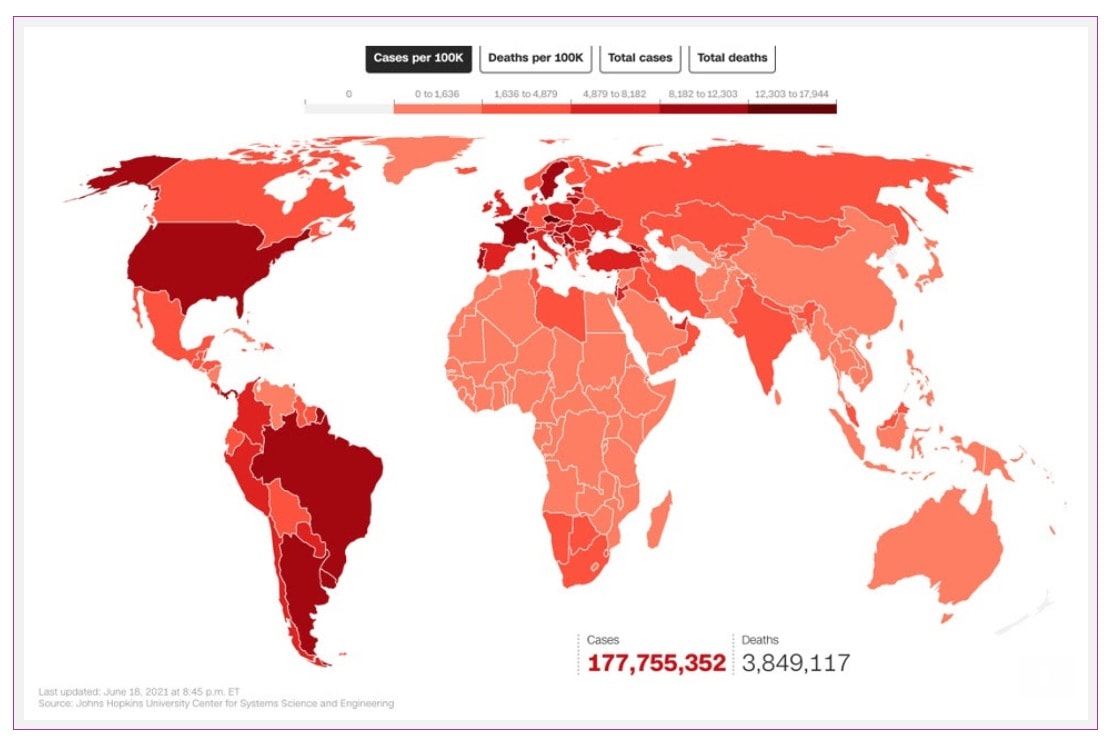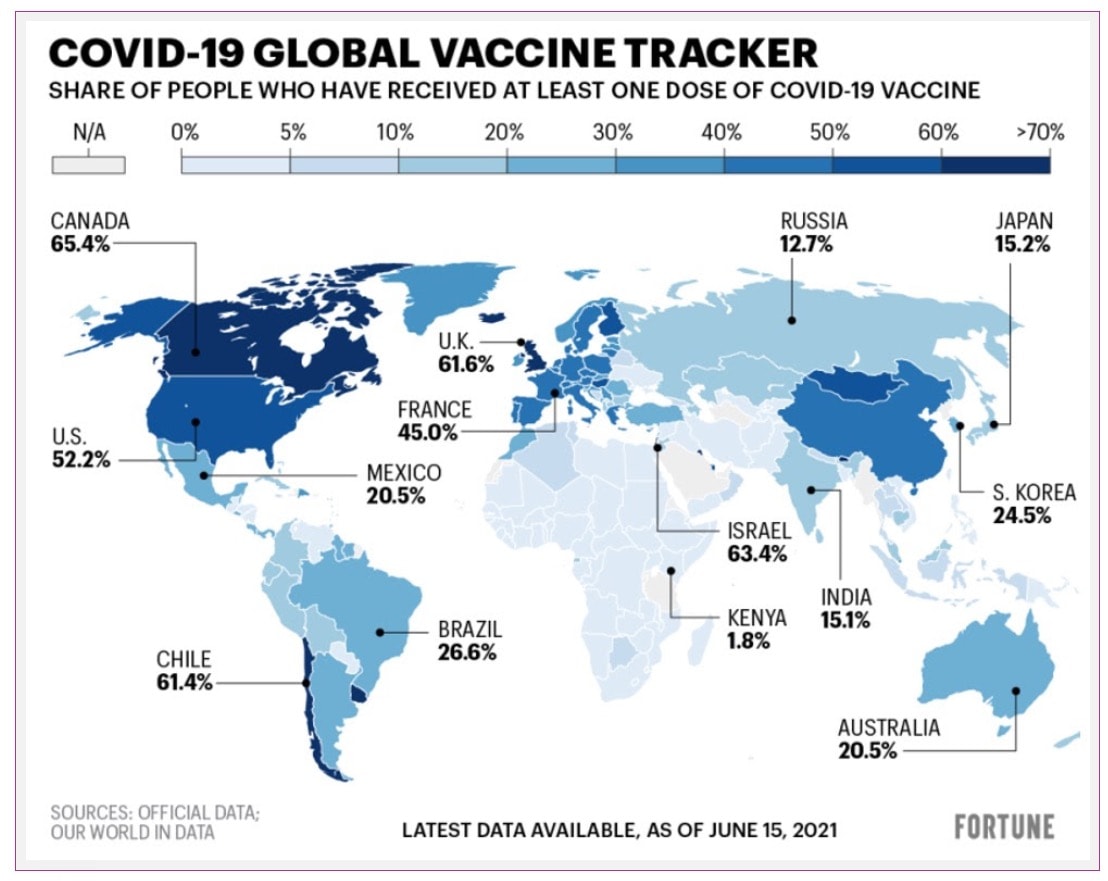I hope you had an enjoyable weekend with your loved ones.
Thank you for joining me again on this COVID-19 roller coaster.
I appreciate all your kind words and encouragement as I update you each week. As you know, I am not compensated for these newsletters but see them as a public service. I do appreciate it when you share with family and friends. The more people who receive accurate information versus the nonsense out there, the better.
Let’s review the bad news and the good news. I will review the common questions of the week and end on my silver lining.
Let’s dig in.
The bad news
Canada has reported over 1.4 million cases of COVID-19, and over 26,000 have died. There have been over 178 million reported cases worldwide, and more than 3.8 million people have died (likely a vast underestimate).
While we are doing incredibly with vaccinations (see below), the U.S. seems unlikely to hit Biden’s goal of 70% of adults receiving at least one dose by July 4. As of Friday, only 65% had received at least one dose, increasing less than 1% over the past two weeks.
Cases are down in Canada, but not so around the world.
WHO Director-General Tedros Adhanom Ghebreyesus says there is a 52% increase in COVID-19 cases and 32% rise in COVID-19 related deaths in Africa this week, “and we expect things only to get worse.”
In Indonesia, more than 350 healthcare providers have been infected with COVID-19 despite being vaccinated with Sinovac. There are growing concerns about the efficacy of some vaccines against the more infectious variants, such as the delta variant.
Russia had over 17,000 new cases on Friday, the highest daily count since February 2021. There was a record 9,056 new cases reported in Moscow alone, increasing nearly 30% from the day before.
The good news
Over 31.2 million COVID-19 vaccine doses have been administered so far across Canada, including 210,638 shots administered in Ontario on Thursday alone, the highest number of vaccines given on a single day. More than 20 percent of adults have now had two shots, and 65% have received at least one – the highest in the world!
This is something to be proud of!
Canada is due to receive millions of doses of Moderna vaccines over the summer months. By the end of June, over 50 million vaccine doses will have arrived, and by the end of July, there will be almost 70 million doses. This may mean a quicker return to more normal life here.
Accelerated second doses
Due to the concern around the Delta variant, Ontario is eager to get second vaccines complete for those living in hot spots (Toronto, Peel, Halton, Porcupine, York, Waterloo, Wellington-Dufferin-Guelph, Hamilton, Durham, and Simcoe-Muskoka). People who received the first dose on or before May 30 can book their second dose this week.
Questions of the week
What do you do if you’ve received one AstraZeneca vaccine?
People who received a first AZ dose can now receive a second dose 8-12 weeks after their first.
The National Advisory Committee on Immunization (NACI) released an updated last week, recommending an mRNA vaccine as the second dose for those who received AZ as their first dose.
This is because:
- We have greater availability of mRNA vaccines now
- There is emerging evidence for a better immune response when an mRNA vaccine follows the first dose of AZ
- There is no reported risk of Vaccine-Induced Immune Thrombotic Thrombocytopenia (VITT) following mRNA vaccine
People who received two AZ can be confident they have good protection against COVID-19 related severe illness and death.
Evidence shows that receiving only one vaccine doesn’t provide adequate protection against COVID-19, particularly against the new VOC, the Delta strain.
Mixing vaccines (i.e., giving one AZ vaccine followed by an mRNA vaccine) is safe and effective. Longer intervals between vaccines (i.e., 12 weeks) provide higher protection than shorter intervals (i.e., 8 weeks).
Spacing with other vaccines
As a precaution, NACI continues to recommend that COVID vaccines be spaced out from other routine immunizations.
- COVID-19 vaccines should be given at least 14 AFTER and 28 days BEFORE other vaccines unless otherwise recommended by your physician.
- This can avoid overlapping side effects from two vaccines
- Will minimize interference in immune responses from the two vaccines (though there is no evidence of interference to date).
Read more on: Can We Mix And Match Vaccines?
What do I need to know about myocarditis and pericarditis?
Health Canada is carefully monitoring reports of myocarditis and pericarditis (inflammation of the heart muscle and heart lining) following mRNA vaccination. There are a small number of case reports but no conclusive evidence at this point.
Preventing COVID-19 spread remains important, and vaccination is still recommended, including eligible young people aged 12-18 years. According to Health Canada, the benefits of the mRNA vaccines continue to outweigh their risks of myocarditis or pericarditis.
What does myocarditis or pericarditis look like?
Symptoms include:
- Chest pain
- Shortness of breath
- Palpitations or rapid heart rate
If you or your child experience any of these symptoms following mRNA vaccination, please go to the nearest emergency room.
What investigations do we complete?
Evaluation for myocarditis/pericarditis include:
- Electrocardiogram (ECG)
- Blood work: troponins
- PCR testing for COVID-19, antibodies to COVID-19, other viral infection testing (i.e., enterovirus PCR)
- Echocardiogram.
- To rule out other causes, consultation with an infectious diseases specialist or rheumatologist may be considered
Who has been affected so far?
- There have been reported cases in the U.S., Canada, and Israel.
- Cases were more common after the second mRNA dose
- Symptoms came within a few days of vaccination
- Most cases were adolescent or young males
- Cases had mild illness and responded to conservative management versus intensive therapy
- No people have died from myocarditis/pericarditis after an mRNA vaccine.
How is myocarditis/pericarditis treated?
Patients are being treated with nonsteroidal anti-inflammatory medications such as Ibuprofen for symptomatic relief. Sometimes steroids are used to decrease inflammation. A cardiologist, infectious disease doctor, and rheumatologist are involved in decision-making about these patients.
Are there long-term effects from myocarditis/pericarditis?
So far, we don’t have much data on this, but currently, the small number of cases are mild and self-resolved without intensive management. There are no expected long-term complications for these patients.
The silver lining of the week
I was so appreciative this week to have several people thank me for my newsletters and my daily Instagram updates. A few parents cried when they told me how this education had helped them this year to manage their anxiety around the pandemic. Many people tell me they do not watch the news or engage with other social media due to concerns about misinformation.
I am so happy to be part of your day and week and am immensely humbled that you turn to me for information. Thank you.
Have a fabulous week!
Stay healthy and safe,

Dina is a wife, mother of 4, and adrenaline junky. She loves to share children’s health information from her professional and personal experience. More About Dr Dina.



![[Dr. Dina News] IMPORTANT UPDATE re. VIRTUAL CARE](https://n5g4c8n2.rocketcdn.me/wp-content/uploads/2021/01/dr-dina-kulik-kids-and-virtual-care-1a-400x250.jpg)
![[Dr. Dina News] COVID-19 Vaccine for Infants and Young Children.](https://n5g4c8n2.rocketcdn.me/wp-content/uploads/2021/04/dr-dina-kulik-kids-and-vaccines-400x250.jpg)
![[Dr. Dina News] COVID-19 Vaccine for Infants and Young Children.](https://n5g4c8n2.rocketcdn.me/wp-content/uploads/2022/04/DRD-1-400x250.jpg)






